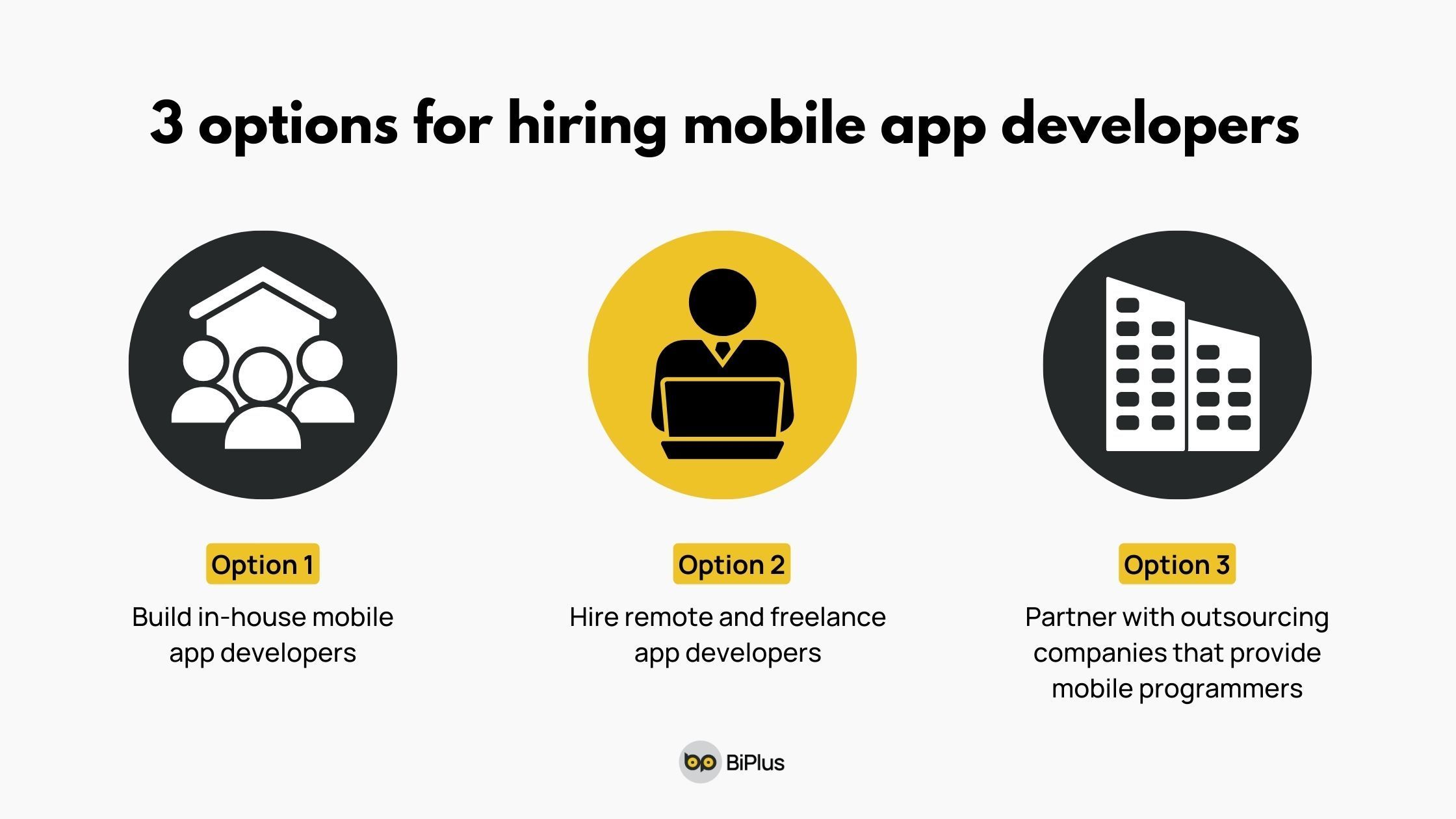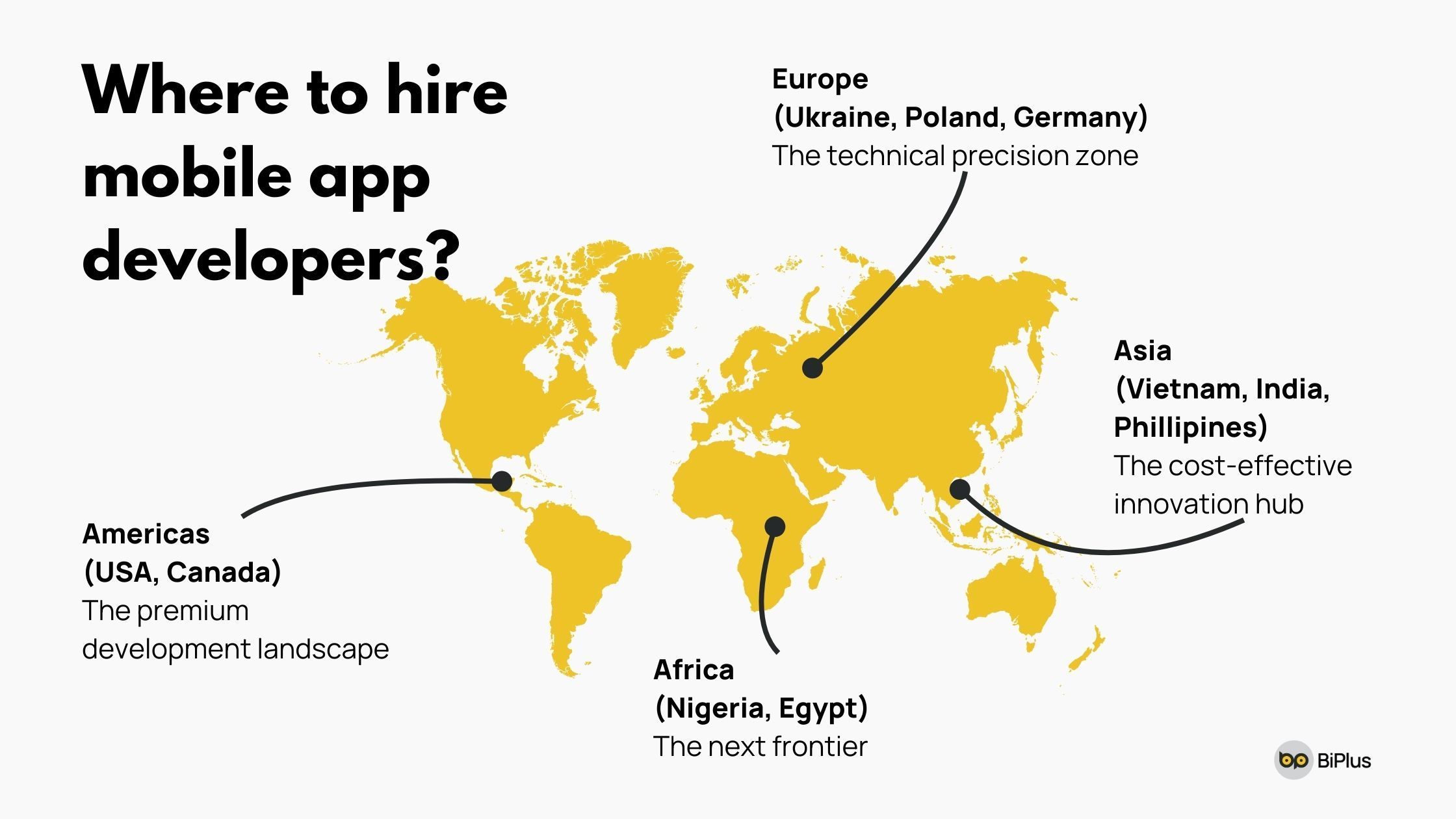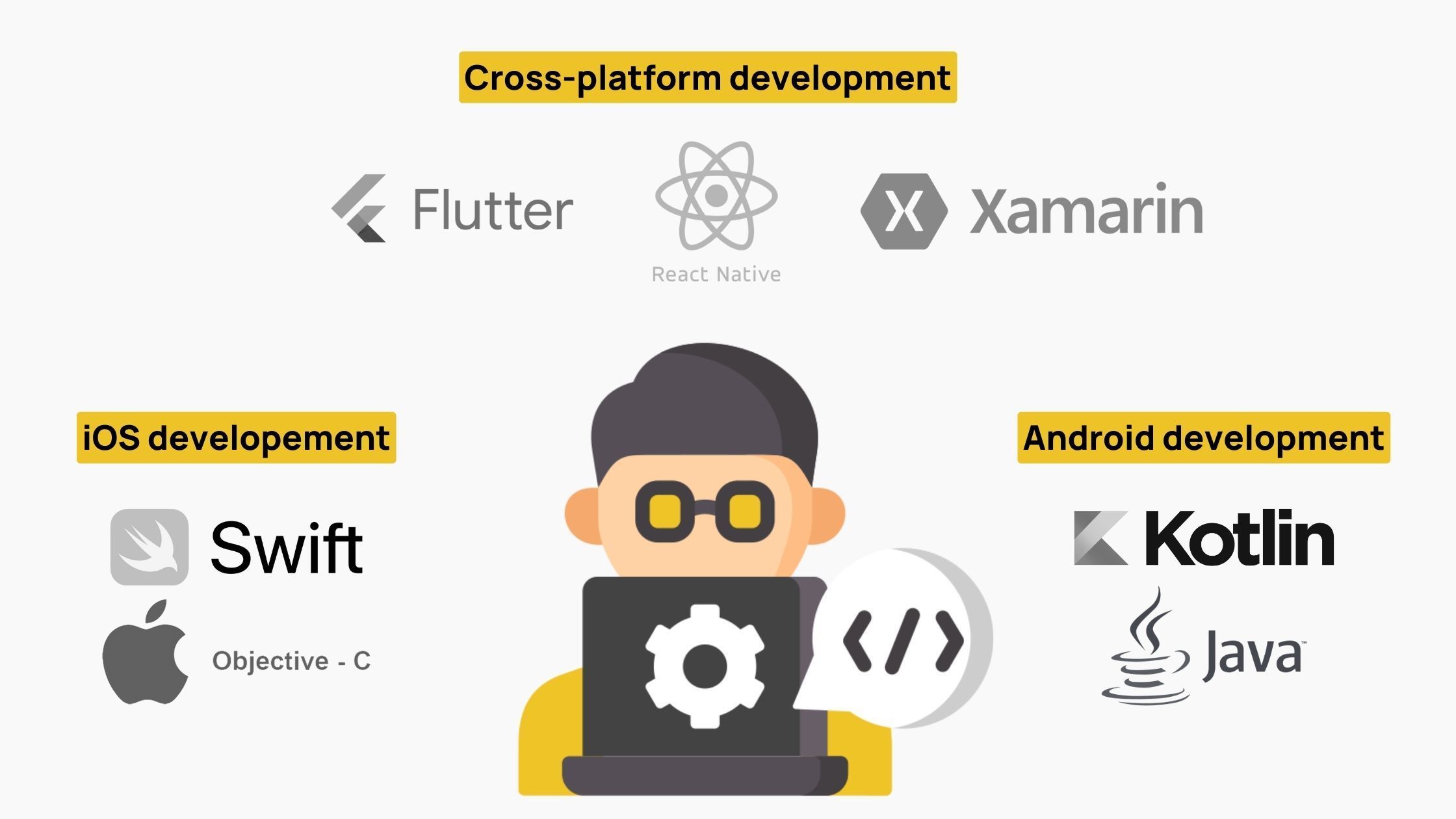With over 19 million mobile app developers and thousands of tech talent companies worldwide, do you feel overwhelmed when looking for talents?
The mobile app development market has exploded in recent years, creating both opportunities and challenges for businesses looking to build digital products.
What sounds like a straightforward hiring process can quickly become complex, with lots of factors to consider beyond just technical skills.
But no worries!
This guide will break down the process into clear, actionable steps to help you navigate the mobile app developer hiring landscape. We'll provide a practical framework for identifying, evaluating, and selecting development talent that aligns with your project goals.
By the time you finish reading, you'll have a clear, repeatable framework for identifying, evaluating, and securing the right mobile app development talent. No fluff, just practical insights.
Shall we get started?
7 simple steps to find your ideal mobile app developers
Step 1: Choose the right hiring option
Hiring mobile app developers isn't a one-size-fits-all scenario, like you wouldn't buy a sports car for moving furniture
There are mainly three hiring model options you can choose from:

Option 1. Build in-house mobile app developers
This is your full-time development team who embed deeply in your company culture. They're ideal for:
- Continuous product development.
- Apps requiring deep institutional knowledge.
- Companies with ongoing maintenance needs.
- Projects demanding tight integration with existing systems.
The pros: Complete control and deep integration with your company culture.
The cons: Hiring in-house can lead to significant salaries, recruitment costs, the time-consuming process of finding top talent, and additional overhead like benefits, equipment, workspace
Option 2. Hire remote and freelance app developers
Freelancers are quick, specialized, and usually ready to join your project. Hiring freelancer app programmers is perfect for
- Rapid prototyping.
- Specific feature development.
- Short-term and small projects.
- Budget-constrained initiatives.
They're cost-effective and offer flexibility - but their reliability can be unpredictable, their availability can be inconsistent and some of them may be not good at communicating.
Here are some popular platforms to find them: Upwork, Toptal, Freelancer.com, GitHub Jobs and LinkedIn ProFinder.
Option 3. Partner with outsourcing companies that provide mobile programmers
Outsourcing companies are your full-service development teams. They do not just code - they can provide practical consultation and partner with you in the long term.
Hiring mobile app developers from outsourcing companies is ideal for:
- Complex, multi-phase projects.
- Startups without internal tech infrastructure.
- Companies needing end-to-end development.
- Businesses requiring scalable solutions.
The trade-off? Your success depends heavily on choosing the right provider. Communication and quality can vary wildly.
To find the ideal ones, you should thoroughly evaluate their portfolio, technology expertise, communication processes, price models (fixed price vs. time & material) and past client testimonials.
Quick Comparison of 3 Hiring Models
| Hiring Model | Best For | Pros ✅ | Cons ❌ | Estimated Cost Range |
|---|---|---|---|---|
In-house Developers | Long-term projects, continuous development | Full control, deep integration | Highest overhead, time-consuming hiring | $80,000 - $150,000/year per developer |
Freelancers | Short-term projects, specific tasks | Flexible, cost-effective | Inconsistent availability, variable quality | $20 - $150/hour |
Outsourcing Companies | Complex, multi-phase projects | Scalable, comprehensive support | Potential communication challenges | $25 - $200/hour |
📌 Pro Tip
Don't just look at price tags. Compare these options based on cost, expertise, flexibility, and how quickly they can get your app to market.
Step 2: Select convenient region to hire app developers

Developers are everywhere these days. Your talent pool isn't just local - it's global. Here are some popular regions to find talents.
Americas: The premium development landscape
If you prioritize cutting-edge technology, this region offers unparalleled innovation. Developers here are often at the forefront of technological trends, especially in tech hubs like Silicon Valley, Seattle, and New York. Best suited for companies that:
- Locate in the Americas.
- Require rapid innovation.
- Have flexible budgets.
- Need immediate, high-touch collaboration.
- Operate in advanced tech sectors like AI, blockchain, or cutting-edge mobile technologies.
Europe: The technical precision zone
Countries like Ukraine, Poland, and Germany are gold mines of skilled mobile developers. They bring strong work ethics and technical expertise at more moderate rates.
Particularly ideal if you're:
- Based in Europe or Middle East.
- Working on enterprise-level applications.
- Requiring strong data protection and compliance.
- Seeking developers with rigorous technical training.
- Needing teams that excel in complex, regulated industries like finance and healthcare.
Asia: The cost-effective innovation hub
Vietnam, India, and the Philippines have become development powerhouses. They have extremely cost-effective with a growing reputation for quality delivery.
This region is perfect for companies in:
- APAC and Middle East markets.
- Cost-conscious regions.
- Businesses needing rapid scaling.
- Startups and mid-sized companies.
- Industries requiring large development teams at competitive rates.
Africa: The next frontier
Emerging tech hubs in Nigeria and Egypt are creating exciting opportunities. Affordable rates and a growing pool of talented app developers make this an increasingly attractive option.
Africa is ideal for businesses:
- In Middle Eastern markets.
- Looking for fresh, innovative approaches.
- Wanting to invest in emerging tech ecosystems.
- Seeking cost-effective solutions with high potential.
- Interested in supporting developing tech markets.
Regional Development Talent Comparison
| Region | Talent Strengths | Average Rates | Best For | Ideal If You're Located In |
|---|---|---|---|---|
Americas | Cutting-edge tech, Silicon Valley expertise | $100 - $250/hour | High-complexity, innovation-driven projects | The Americas, looking for direct cultural alignment |
Europe | Technical precision, strong engineering background | $50 - $150/hour | Enterprise solutions, detailed technical work | Europe and Middle East, seeking robust regulatory compliance |
Asia | Large talent pool, cost-effective | $20 - $100/hour | Scalable development, cost-sensitive projects | APAC, Middle East, or looking for budget-friendly options |
Africa | Emerging talent, innovative ecosystem | $20 - $50/hour | Startups, experimental projects | Middle Eastern markets, looking for emerging tech talent |
📌 Pro Tip
Don't just look at rates. Consider time zones, language capabilities, and cultural compatibility.
Step 3: Define your technical requirements

Technical requirements are where you transform a vague idea into a precise development blueprint.
Platform selection is your first critical decision.
Are you targeting iOS app development, Android appdevelopement, or going cross-platform development?
Each path carries its own strategic implications. iOS offers a premium market with higher monetization potential, while Android provides broader global reach. Cross-platform frameworks like Flutter and React Native promise the holy grail of "write once, run anywhere" development - but they're not magic wands.
Your tech stack is the backbone of your app's functionality.
- For iOS, you're looking at hiring Swift developers and Objective-C developers.
- For Android, you should focus on hiring Kotlin developers typically or Java.
- For cross-platform development, consider finding React Native programmers, Flutter programmers, or Xamarin talents.
Experience levels matter dramatically.
A junior developer might cost less, but they'll require more guidance. Senior developers bring complex problem-solving skills but command premium rates. Mid-level developers often represent the sweet spot - experienced enough to deliver quality, but still hungry to prove themselves.
Industry expertise can be a game-changer.
A developer who's built fintech apps will approach a financial product differently than someone from a gaming background. They'll understand nuanced user expectations, compliance requirements, and potential technical challenges before they emerge.
Technical Requirements Quick Reference
| Aspect | Key Considerations | Recommended Approach |
|---|---|---|
Platform | iOS, Android, Cross-Platform | Evaluate based on target market and budget |
Tech Stack | Programming Languages, Frameworks | Choose based on project complexity and long-term scalability |
Experience Level | Junior, Mid-level, Senior | Match developer expertise to project requirements |
Industry Expertise | Sector-specific knowledge | Prioritize developers with relevant domain experience |
Step 4: Vet potential developers or teams
When reviewing portfolios, don't just look at the apps. Examine the complexity, user experience, and how elegantly technical challenges were solved. An app that looks simple might represent sophisticated backend engineering. Conversely, a visually complex app might hide fundamental architectural weaknesses.
References and reviews are your helpful tools. Platforms like Clutch, LinkedIn, and GitHub are pretty reliable. Look for patterns in feedback. Consistent praise is good, but also pay attention to how teams handle criticism and challenges.
Technical interviews are your most powerful evaluation method. But they're not just about solving code. You want to understand a developer's thought process, their approach to problem-solving, and how they communicate complex technical concepts.
Soft skills are often overlooked but are crucial. Can they explain technical concepts clearly? Do they ask thoughtful questions? Are they proactive in communication? These qualities often determine the difference between a good developer and an exceptional one.
Mobile App Developer Evaluation Checklist
| Evaluation Criteria | 🔎 What to Look For | 🚩 Red Flags |
|---|---|---|
Portfolio | Complex projects, elegant solutions | Lack of diverse or meaningful projects |
References | Consistent positive feedback | Vague or generic recommendations |
Technical Interview | Clear problem-solving, communication | Inability to explain technical decisions |
Soft Skills | Proactive communication, collaboration | Poor responsiveness, defensive attitude |
Step 5: Compare cost vs. value

Cost is what you pay. Value is what you get.
Location dramatically influences rates.
A developer in San Francisco might charge $250 per hour, while an equally skilled developer in Eastern Europe might charge $50-$100. But don't fall into the trap of purely price-driven decisions.
Hidden costs can break the bank.
Communication challenges, extended development timelines, and required rework can turn a seemingly cheap solution into an expensive nightmare. A slightly more expensive team that communicates clearly and delivers efficiently is often more cost-effective.
Step 6: Test with a small project
Before committing to a full-scale project, you should assign a smaller, well-defined task. This isn't just about testing technical skills - it's about understanding collaboration dynamics.
A trial project reveals communication styles, responsiveness, and ability to meet deadlines.
It's your low-risk opportunity to see how a potential development partner actually works.
Step 7: Formalize the collaboration
In this step, you've found your ideal development partner.
Clear contracts protect both parties. Non-disclosure agreements safeguard your intellectual property. Detailed milestone plans create accountability.
You should use collaboration tools like Jira, Slack, and Trello for effective project management communication. Regular check-ins, transparent progress tracking, and clear communication are keys.
Collaboration Formalization Checklist
| Aspect | Essential Components | Best Practices |
|---|---|---|
Contracts | Scope of work, deliverables | Clear, detailed, protecting both parties |
Intellectual Property | NDAs, ownership clauses | Comprehensive protection of your assets |
Communication Tools | Project management platforms | Transparent, real-time collaboration |
Milestone Planning | Defined checkpoints, deliverables | Regular progress tracking, accountability |
How much does it cost to hire an app developer?
Here's an estimated cost table to hire mobile app developers based on global regions. These rates are approximate and may vary depending on the developers' experience, project complexity, and hiring model (freelance, in-house, or outsourcing).
Estimated hourly rate for mobile app developers in different regions
| Region | Estimated Hourly Rate (USD) |
|---|---|
North America | $70 - $120 |
Western Europe | $60 - $90 |
East Asia | $40 - $70 |
Eastern Europe | $35 - $60 |
Latin America | $30 - $50 |
Southeast Asia | $25 - $45 |
South Asia | $20 - $35 |
Africa | $20 - $40 |
At BiPlus, we provide skilled mobile app developers to fill every one of your tech gaps
We don't view mobile app development as a mere technical task. Instead, we focus on delivering apps that effectively support your business goals. Our comprehensive services will meet your needs on:
- UI/UX modernization.
- Robust and scalable back-end development.
- Software and system integration that minimizes the disruption on operation.
- Emerging technologies implementation such as AI/ML, blockchain, cloud, etc.
- Enhancement of cyber security and regular compliance.
Our expertise spans the mobile development:
- Kotlin, Swift and Objective-C for iOS and Android native development.
- Flutter and React Native for cross-platform solutions.
- Java, Python, Node.js, PHP, etc. for back-end development.
- PostgreSQL, MySQL, MongoDB, OracleDB for database.
- And additional technologies and tools like AWS, Google Cloud, Azure, GAN, NLP, GenAI, Computer Vision.
Successful projects in fintech, banking, telecommunications, e-commerce and other key sectors show our ability to tackle diverse technical challenges.
With a pool of 150+ programmers, we can scale up or down rapidly, ensuring you have the right talent at exactly the right time. Moreover, we apply Agile methodology to move quickly, helping you respond fast to market opportunities and customer demands.
📍 Here are some case studies of how we built cool mobile applications:
What's your need?
Contact us today, our mobile teams love to hear from you.














